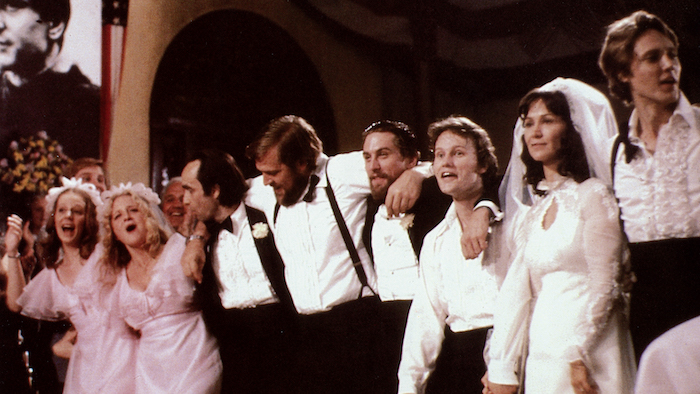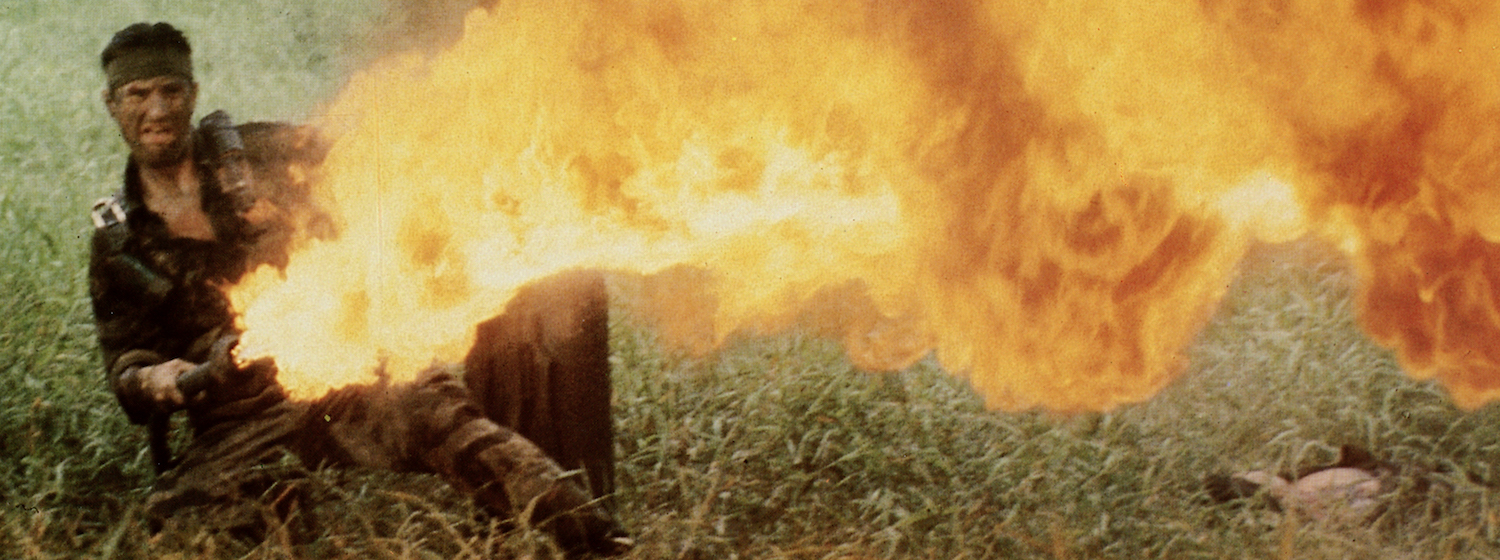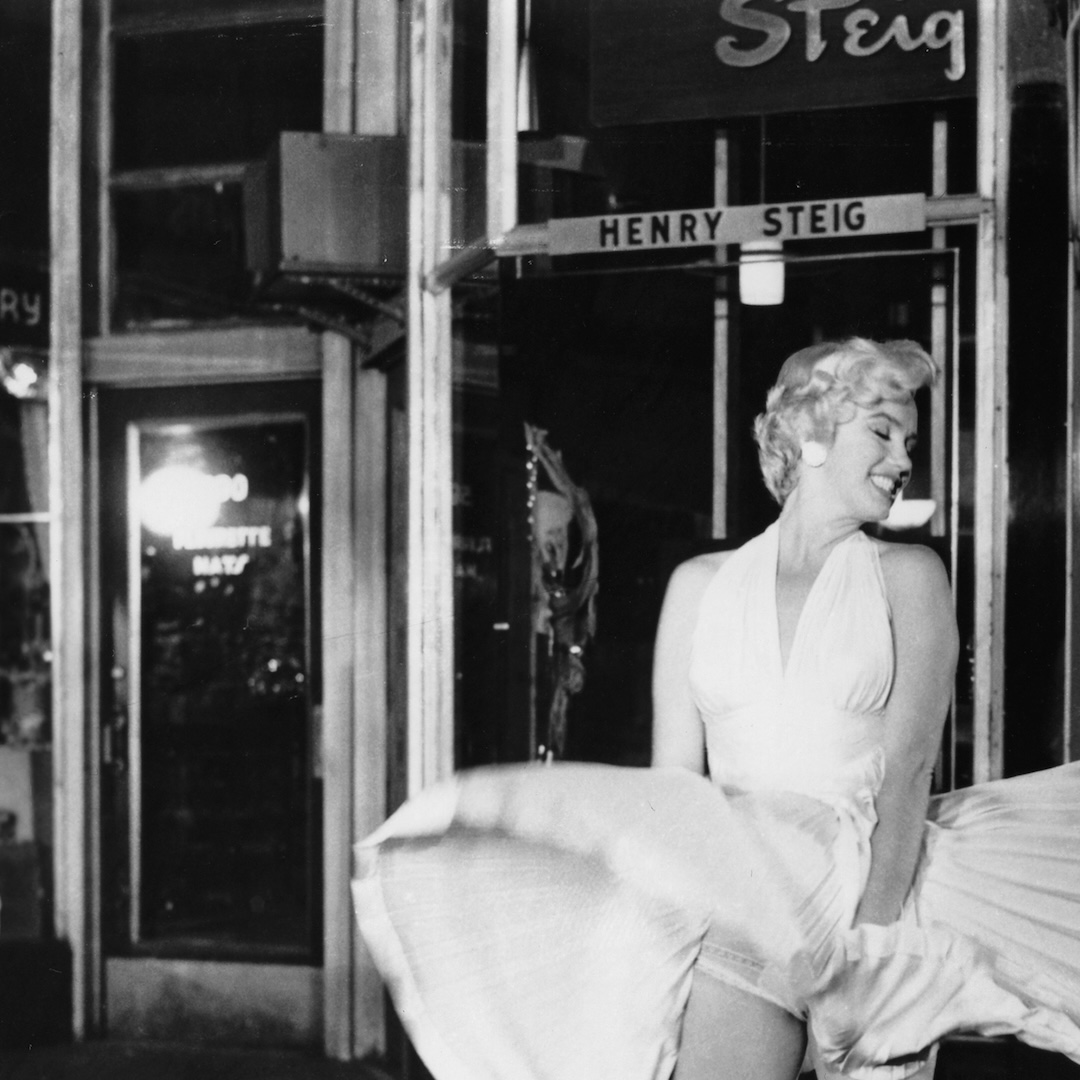How The Deer Hunter’s Oscar Win Ended Hollywood’s Unofficial Moratorium on the Vietnam War
June 8, 2020 By Go BackThe final public appearance of America’s top cowboy must have been something of an ordeal for John Wayne. Not only because he was stricken with the cancer he would die from in a matter of months, but also because, as the presenter of the Best Picture Oscar of 1978, Wayne had to keep his red-meat conservatism to himself when he opened the envelope and it read “The Deer Hunter.”
Ten years earlier, Wayne had become something of a national laughingstock – especially among liberals and those further left – for directing and starring in The Green Berets, an outrageously simplistic flag-waver set in the jungles of Vietnam.
In the ensuing decade, Vietnam, the most polarizing war in American history since the Civil War, was a conspicuous absence on the big screen. In striking contrast to the two World Wars and even Korea, Vietnam had been something of a phantom event in the movies. Nothing had taken on the conflict directly, like The Green Berets and a largely unseen little movie called Go Tell the Spartans, but the indirect influence of the war could not be denied: metaphorically at least, it filtered on down through westerns, crime movies and even horror movies of the late sixties and first half of the seventies. Which meant, at least on screen, the war was both ubiquitous and invisible at the same time. It lurked behind the facade of genre like a ghost or a bad dream that couldn’t be shaken off. If Vietnam haunted America as a kind of open, unhealed wound, it asserted itself with chilling power in the form of something that would become something of a hallmark of the movies of the day: the Vietnam flashback.

But something had happened by the time John Wayne opened that envelope in April, 1979. Suddenly, or so it seemed, Vietnam was everywhere: over the course of eighteen months four major Hollywood releases – Coming Home, Who’ll Stop the Rain, The Deer Hunter and, later in the year, Francis Coppola’s epic nightmare of a movie, Apocalypse Now – were released. Of this quartet, only Michael Cimino’s The Deer Hunter managed to stir up the kind of controversy that saw the movie draw protests (among anti-Vietnam veterans, among others) in most major cities where it played. The major issues driving this anger were these: the depiction of Vietnamese on both sides – North and South – as sadists and savages, and the game of Russian roulette forced on two of the movie’s principle characters, Christopher Walken’s Nick and Robert De Niro’s Michael. In the first instance, Cimino’s movie was tagged with racism, and in the second, it was attacked for playing loose with the historical record. As in, according to just about anyone who’d actually been there, the Russian roulette business was something of a crock. It had, so far as just about anyone who’d actually been there, never happened.
Up to a point, the charge was baffling because what movie isn’t a metaphor of something or other, but on the other it was inevitable since the depiction of the game was not only central to The Deer Hunter’s plot, it was depicted in the movie with such excruciating suspense it likely generated flashbacks and nightmares all on its own.
I remember travelling from Ottawa, where I was studying film, to Toronto to see the movie in first run, and I recall emerging almost physically shaking from the experience. The last time I’d felt to wrung out by a film was Taxi Driver four years earlier, and it was itself a kind of thinly-disguised Vietnam metaphor about a unglued vet – De Niro’s Travis Bickle – who becomes something of a national hero for perpetrating a righteous bloodbath in the seedy hotel where Jodie Foster’s pubescent hooker turns tricks.
Every bit as intense as Martin Scorsese’s movie, The Deer Hunter – also featuring de Niro as a repressed but explosive veteran – was nevertheless ripe for attack on the basis that it not only fabricated the very thing that made it such a powerful viewing experience, but that it ultimately justified what, certainly by 1979, was an utterly unjustifiable historical quagmire. What was largely unremarked upon, at least at the time, was the fact that, as a metaphor, the Russian roulette sequences were nothing short of stunning and entirely apt. As a dramatization of the self-immolating, decade-long misadventure in southeast Asia, the spectacle of American soldiers blowing their own brains out was possibly a little too on the money. Conservatives like Wayne hated the movie because it showed American soldiers as weak, traumatized and (except for De Niro’s Michael) helpless, while liberals like Jane Fonda hated it because of its blatant racism.
Although the influence of The Deer Hunter, especially at the dawn of the Reagan era, could be felt in the surge of 80s movies that traded in the spectacle of imprisoned American POWs being rescued from captivity in postwar Vietnam (Rambo: First Blood Part II, Uncommon Valor, the Missing in Action series), the ensuing years have diminished its historical status significantly. Certainly, the movie’s depiction of the “Yellow Peril Redux” hasn’t helped, nor has the charge of playing fast with the record, or Cimino’s subsequent status as director of one of the highest-profile flops in movie history: Heaven’s Gate.
But let’s return, for a moment, to that night in April ‘79 when America’s favourite cowboy star – John Wayne – made his last public appearance. At the time, The Deer Hunter marked the end of the unofficial moratorium on movies about Vietnam. That it was so widely attacked for bending the facts in the name of emotional intensity now seems more than a little ironic. It was, after all, simply playing by the same rules that war itself did, which is to say it was, by a long shot, merely trading in a form of dishonesty Vietnam itself was nearly buried beneath. All things considered, it was no more or less accurate than the official record of the war itself. And what, ultimately was worse: the lies the world was told about why America was there in the first place, or a movie that used an especially potent metaphor – Russian roulette – to jar us from our state of denial? If anything, The Deer Hunter finally brought the war back home.












 Follow us on Instagram
Follow us on Instagram